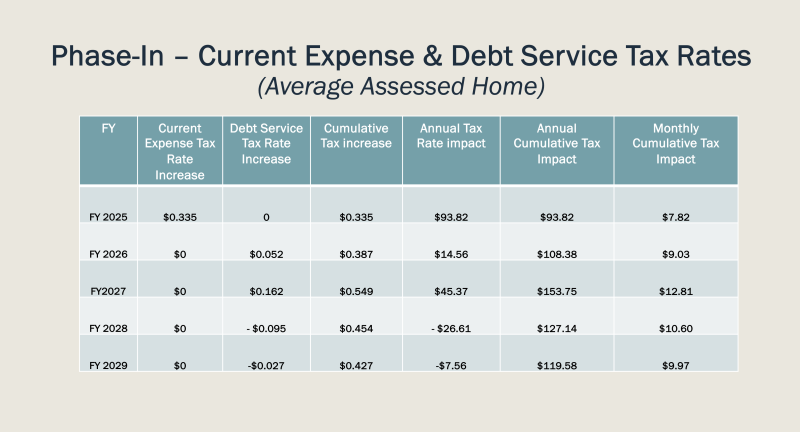Cape superintendent: Funding needed to address growing enrollment
Cape Superintendent Bob Fulton outlined district needs for a new tax rate to generate local revenue at the first of several community presentations regarding the March 26 debt service and operating expense referendum.
About 20 residents attended the meeting at Love Creek Elementary Feb. 27, where Fulton said enrollment issues are driving the need for more funds. The district has grown by 1,600 students in 10 years, Fulton said, and enrollment currently tops 6,600 pupils.
“More and more people are moving here, and they’re moving here with children,” Fulton said. “It’s hard to believe, but they are.”
During this same time period, the district completed nine major capital projects to renovate existing buildings and construct completely new schools, totaling $300 million, he said. In 16 years, the average homeowner has seen a tax increase of just $280, he said, which reflects district efforts to keep increases reasonable.
Even with those major improvements, he said, the district still has the second-lowest tax rate of Sussex County schools, and does not have a capitation tax like other districts, in which taxes are collected on a per-person basis from non-property owners. In the Cape district, $160,000 is generated from every penny in tax, he said.
However, the district budget is struggling, he said. A planned referendum in 2020 that requested a $0.25 increase for operating expenses that would have cost taxpayers an average of $70 per year was canceled due to the pandemic. Federal funding issued during the pandemic was used to offset costs since then, he said. That funding is running out.
Staffing and personnel expenses continue to rise, he said, and the district will continue to hire all staff it qualifies for in order to maintain small class sizes. With 1,200 staff members, the average payroll is $1 million each pay period, he said, and next year there is an anticipated 26% increase in benefit costs, much of it coming from higher health insurance premiums.
Cape High, which was just expanded in 2021 to accommodate 400 additional students, now has more than 2,000 pupils, he said. Another expansion is needed, and to do so, the district office on Kings Highway needs to move so stormwater management infrastructure and more parking can be added to the site, he said.
The district office is a modular erected about 40 years ago and meant to last 20 years, he said, and isn’t large enough to hold all staff. About 40 personnel are located at this site, with another 40 employees are housed in the Fred Thomas Building on DuPont Avenue in Lewes. Of those 80 employees, 16 are administrators, he said.
The district office can’t move unless there’s land to move it to, Fulton said. After sending letters of interest to 16 large property owners in the district, only one responded, he said, and that $15 million, 102-acre parcel rests along Cedar Grove and Mulberry roads.
On this property, a $21 million district office can be constructed, along with a $6 million bus maintenance facility and a $36 million swimming complex, he said.
Buying the property now is more fiscally prudent than waiting, Fulton said, noting that the per-acre price for the nearby Love Creek Elementary property was $75,000 a few years ago; it’s now doubled to $150,000, and land isn’t getting cheaper.
The time has come for a natatorium, he said. About 70 kids are on the boys’ and girls’ Cape High swim teams, Fulton said, and they use the YMCA pool. Space there is limited and students often have to practice until 9 p.m., he said, and there is only a window for parents to watch meets.
The pool at the Sussex Consortium is a therapy pool, he said; as such, the water is warmer than a standard pool, and the size is also not adequate for competition.
“Our kids deserve more than that, and our community deserves more than that too,” Fulton said. “I’d like to have the opportunity for every student that attends any of our schools to learn how to swim.”
In addition to swim team, student and staff use, Fulton said the pool would be available for public memberships to district residents. The fact that it would not be attached to a school would make it easier for the community to access during the day, seven days a week, he said.
Running a pool isn’t cheap, Fulton said. Maintenance costs are built into the current expense portion of the referendum, he said, and memberships would generate revenue to assist with costs. District leaders have visited swimming pools to review costs and operations, he said, and learned that Sussex Academy’s 25-meter pool is closed to memberships.
Finance Director Oliver Gumbs said Sussex Academy has a 90-person waitlist to join its pool. Cape leaders are proposing a 50-meter pool with spectator seating, which would allow for twice the amount of memberships as Sussex Academy, he said.
Another way the district could generate revenue to fund natatorium operations would be to open the complex for tournaments, which would increase revenues exponentially, Fulton said, noting that groups pay $40,000 to $60,000 for weekend use of pools for large events. Cape’s natatorium would be the largest in a 100-mile area, Fulton said.
“We want to capitalize on that and not miss opportunities just because we want to keep a smaller pool,” Fulton said.
One audience member said it’s not cost-effective to build a pool for just 70 students and said the pool better be for staff and community use also. The man then said the district assumes a minority from Milton would be able to drive to the pool to use it.
Fulton said that his presentation does not show that the pool would be open for only 70 kids; the purpose of the pool is to promote health and wellness for all district students, with a secondary goal being to offset costs through public memberships and tournaments.
Without a centralized bus maintenance facility, the district’s 50 buses are scattered, Fulton said. Gumbs said the facility would allow employees to perform routine maintenance such as oil changes, tire rotations and brake checks; major issues such as blown engines would be sent to a specialized mechanic as such incidents happen infrequently.
One attendee said he wanted money spent on teachers, and asked who screwed up and didn’t see the growth coming. The man said the school should’ve gotten more money from developers who make all the money and sell the beach.
Fulton said he agreed, but the district can’t control development. He added the district did see this coming, and has done a good job staying ahead of growth by building a school every two to three years. All buildings are currently in a good spot enrollment-wise, except the high school, he said.
If the referendum is defeated, Fulton said the district will reconvene and ask for more next year. He also said the district will submit another certificate of necessity for expansions at the high school, which was denied by the state and would have been funded 60/40, state/local.
The referendum calls for an increase of $0.21 to the capital projects tax rate that would pay for the property, natatorium, district office and bus maintenance facility, which have a combined cost of $78.6 million. The average homeowner would pay an additional $5 per month, or $60 per year, for these improvements.
The district is also asking for a $0.33 operating expense tax rate increase that would generate just over $5 million annually and would cost the average homeowner just under $8 a month, or $94 a year.
The operating expense tax increase would be implemented one time July 1, officials said, and the debt service increase would occur in increments, with the first increase beginning a year later, July 1, 2025, and then again July 1, 2026.
Taxes would increase on average $93.82 in fiscal year 2025, an additional $14.56 in fiscal year 2026 and then by $45.37 in fiscal year 2027. In the peak fiscal year 2027, taxpayers would pay $12.81 a month, or $153.75 a year.
After fiscal year 2027, taxes would decrease over the next seven years as the debt service decreases for the project, and bonds from projects such as the current high school are paid off, Fulton said.
District figures show that in fiscal year 2028, taxes would decrease by $26.61, and would decrease an additional $7.56 in fiscal year 2029. In 2029, taxpayers would pay $9.97 a month, or $119.58 a year.
Future community meetings will be held at 6 p.m., Monday, March 11, at Milton Elementary and Monday, March 18, at Lewes Elementary.
The election is set for Tuesday, March 26. District residents who are U.S. citizens and over age 18 are eligible to vote. Polls will be open from 7 a.m. to 8 p.m. at Cape High, Mariner Middle and Rehoboth Elementary.
For more information about the referendum, go to capehenlopenschools.com/referendum2024, which also includes resources for tax assistance programs, tax relief for seniors and a tax calculator.






















































